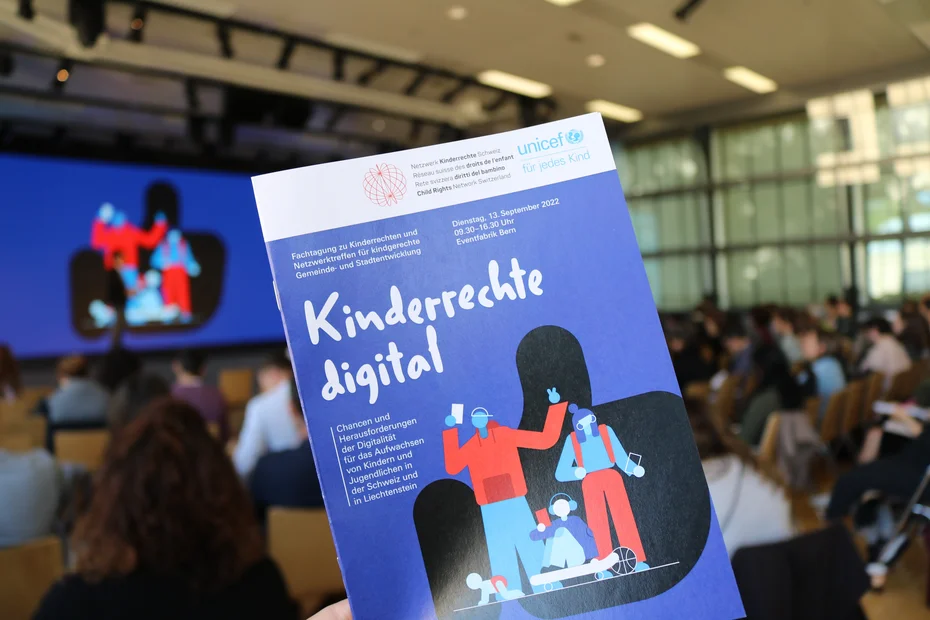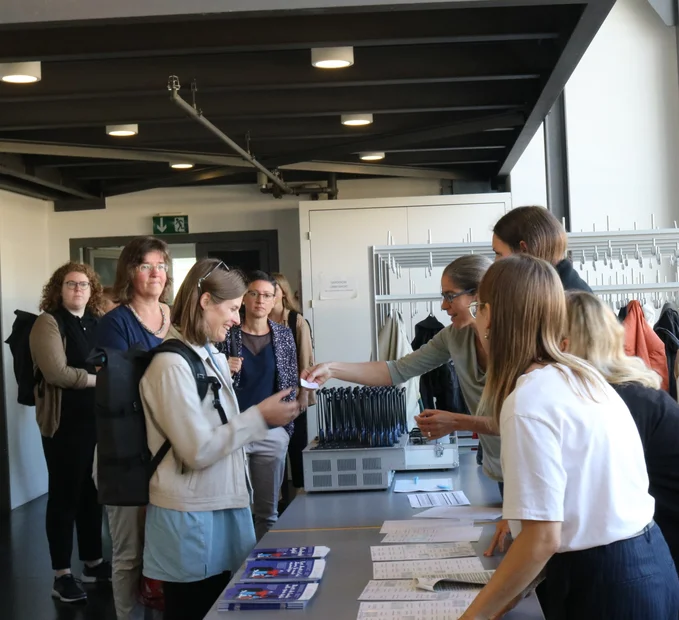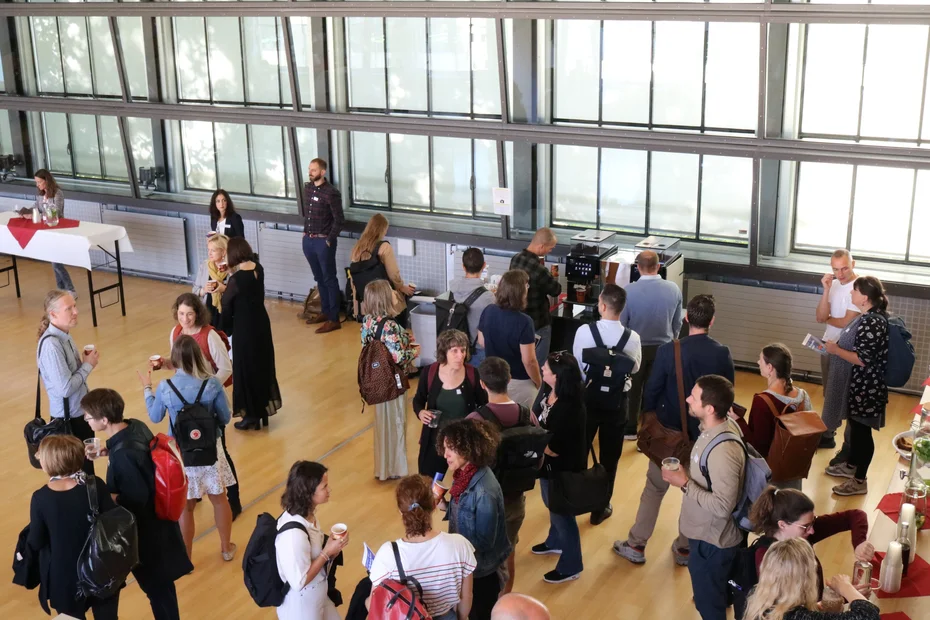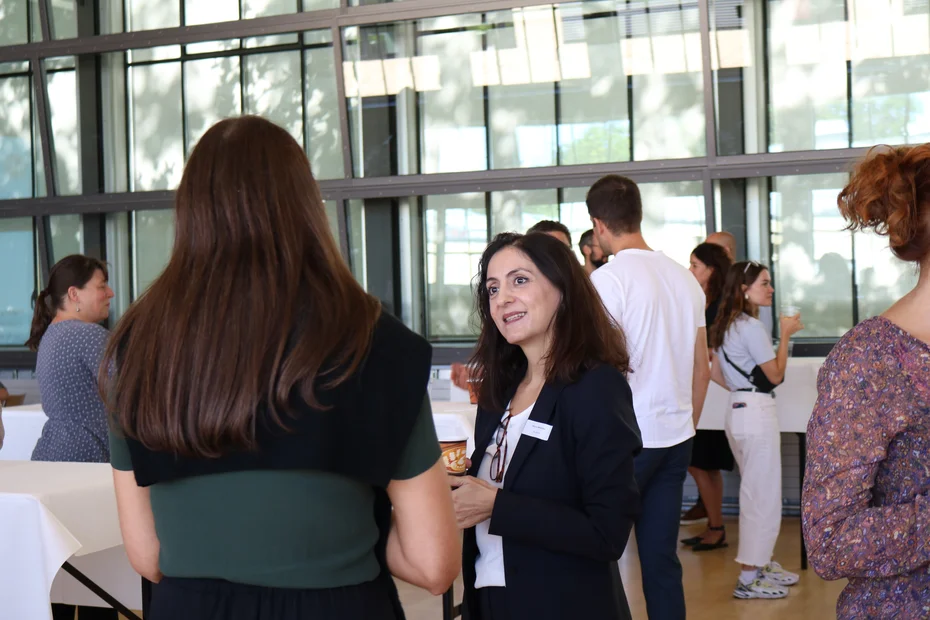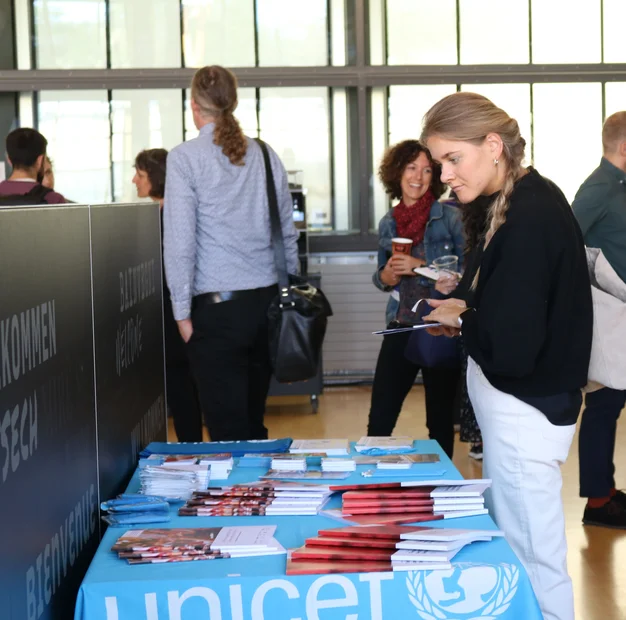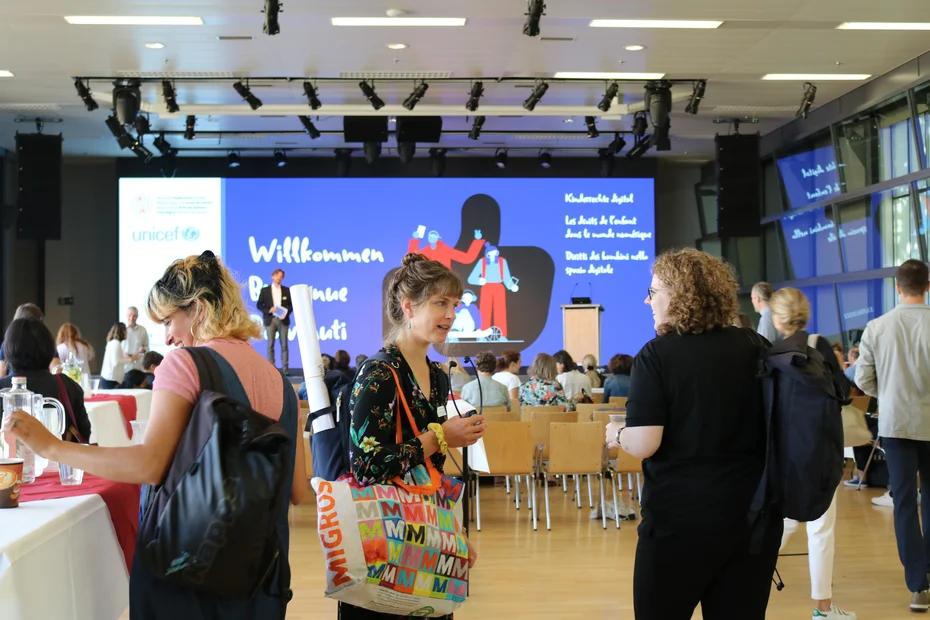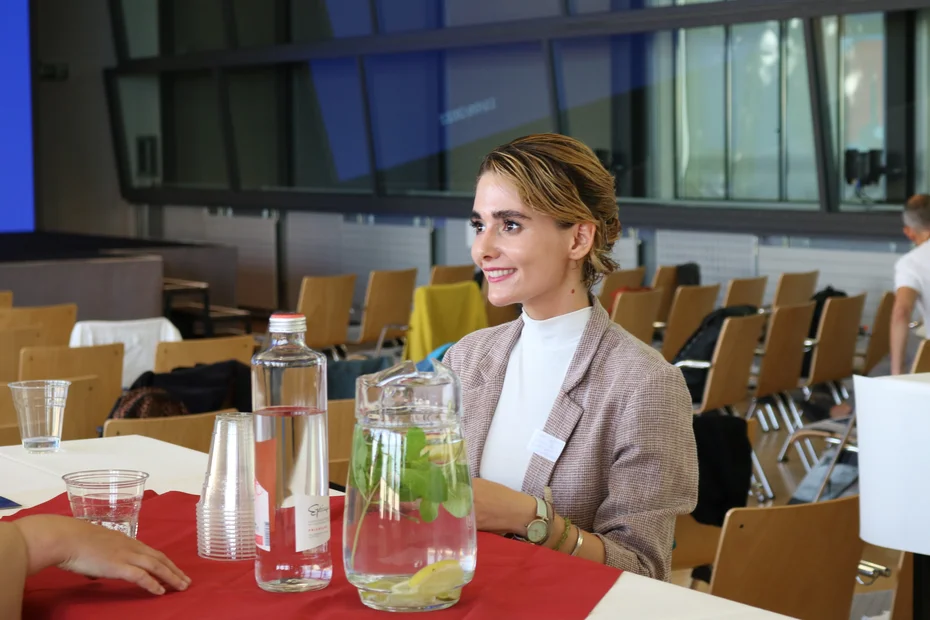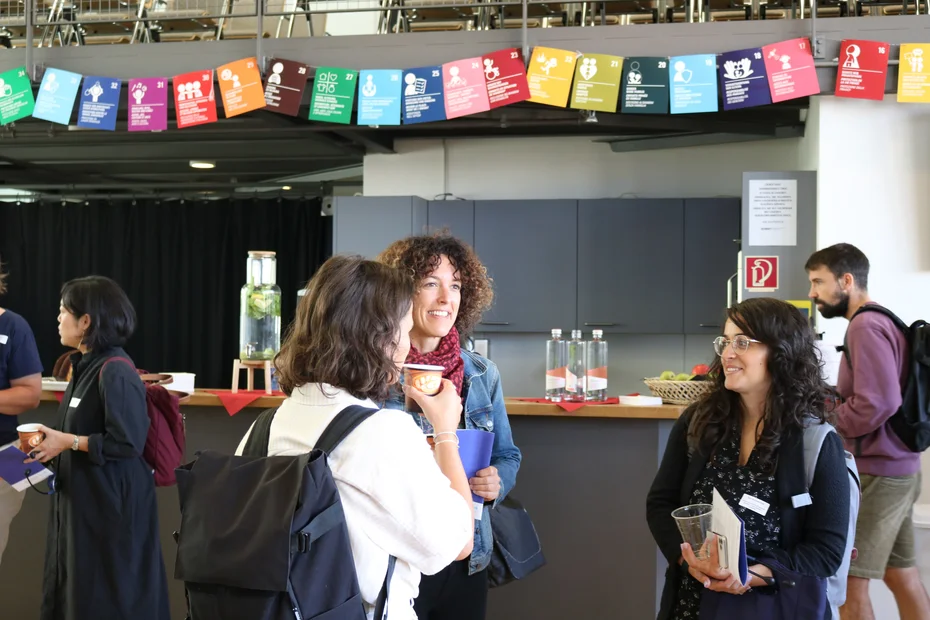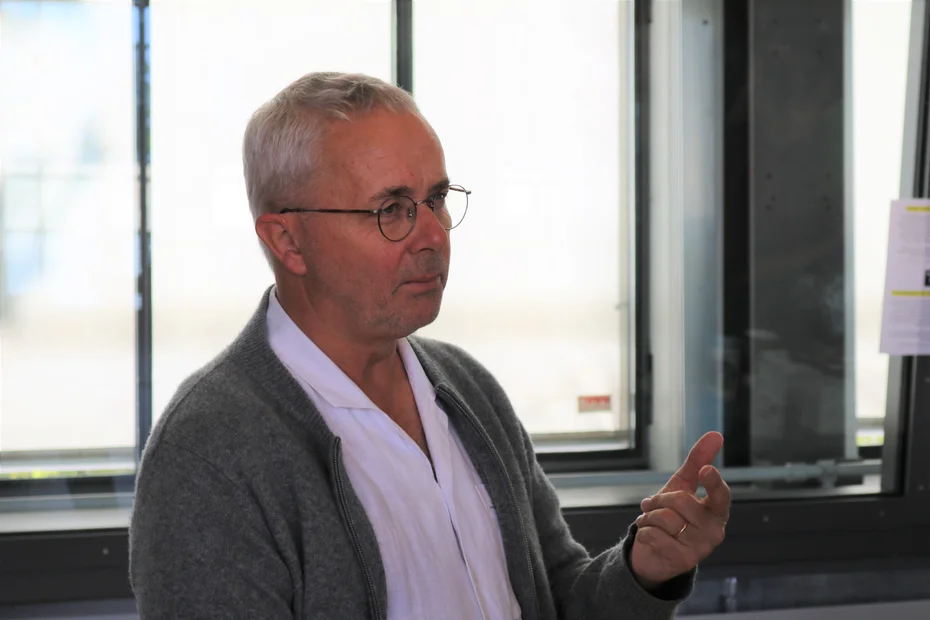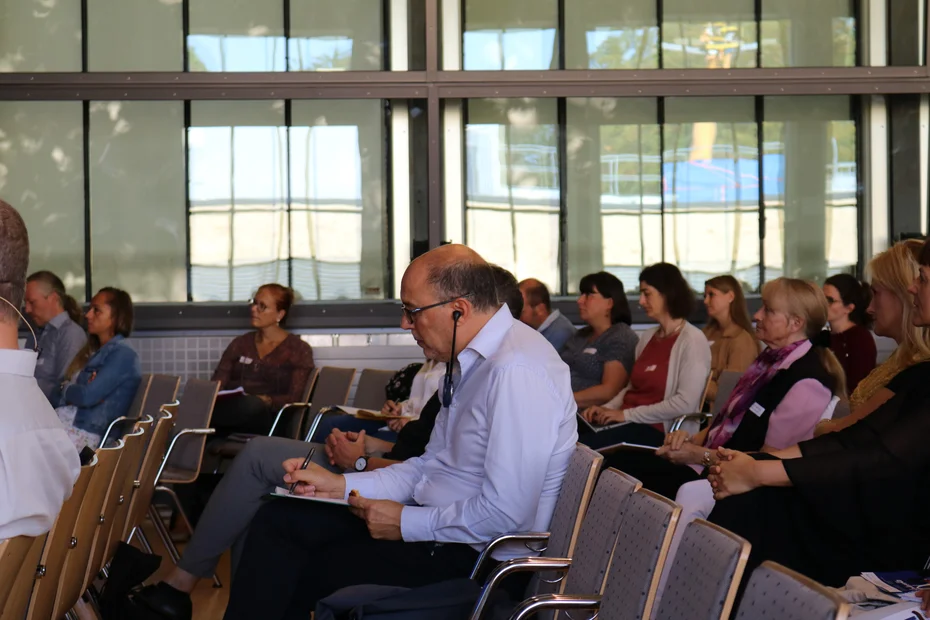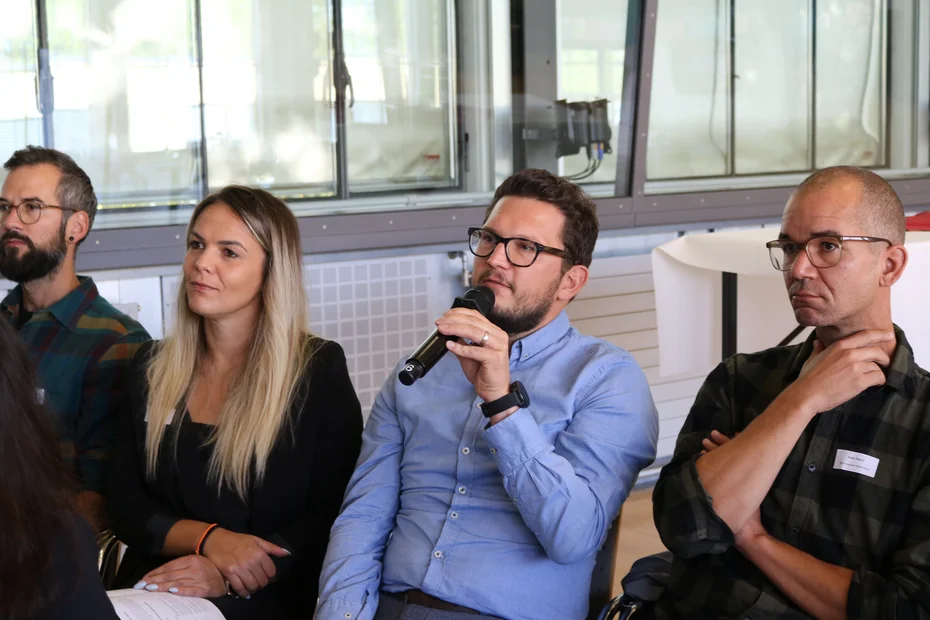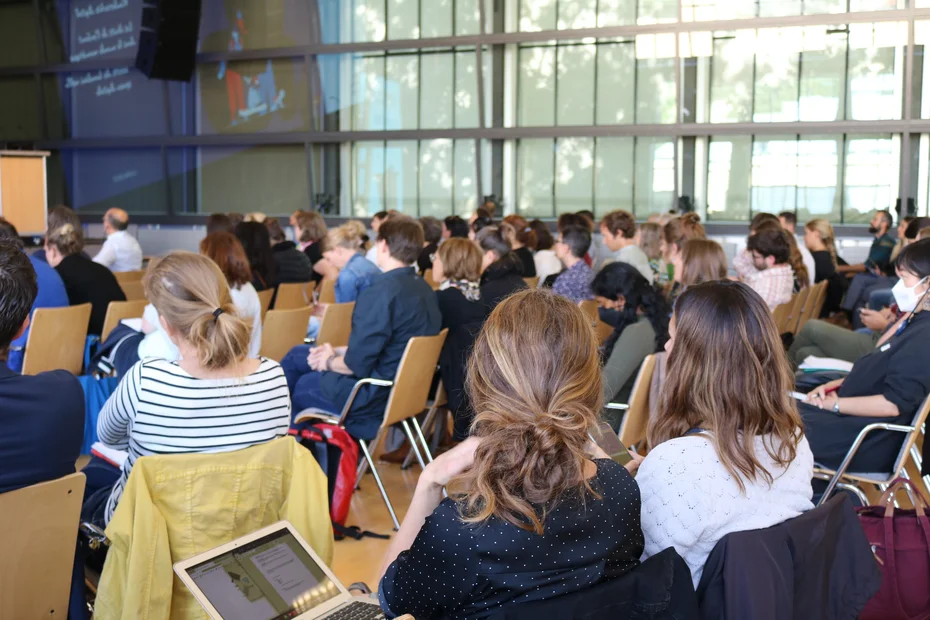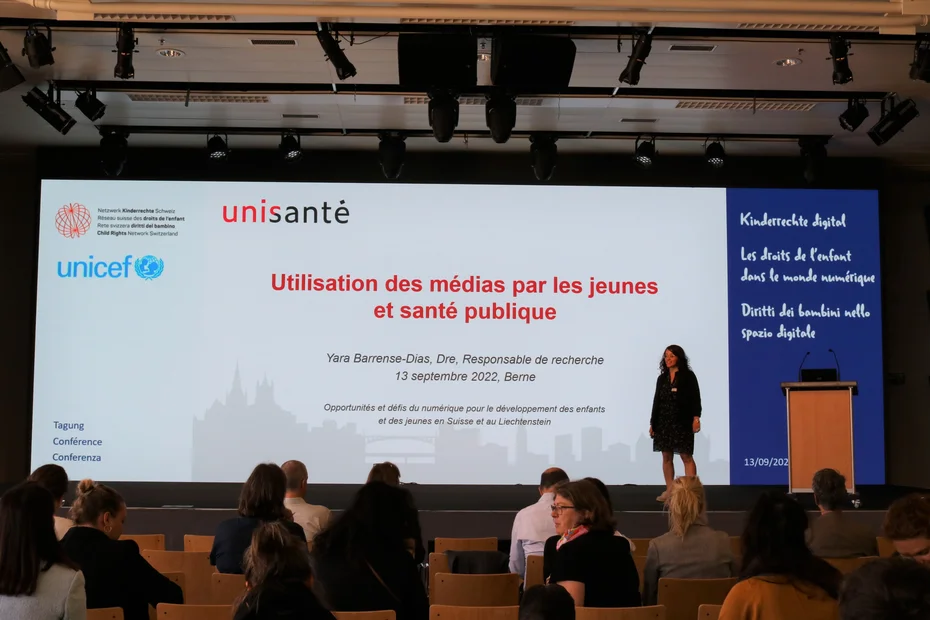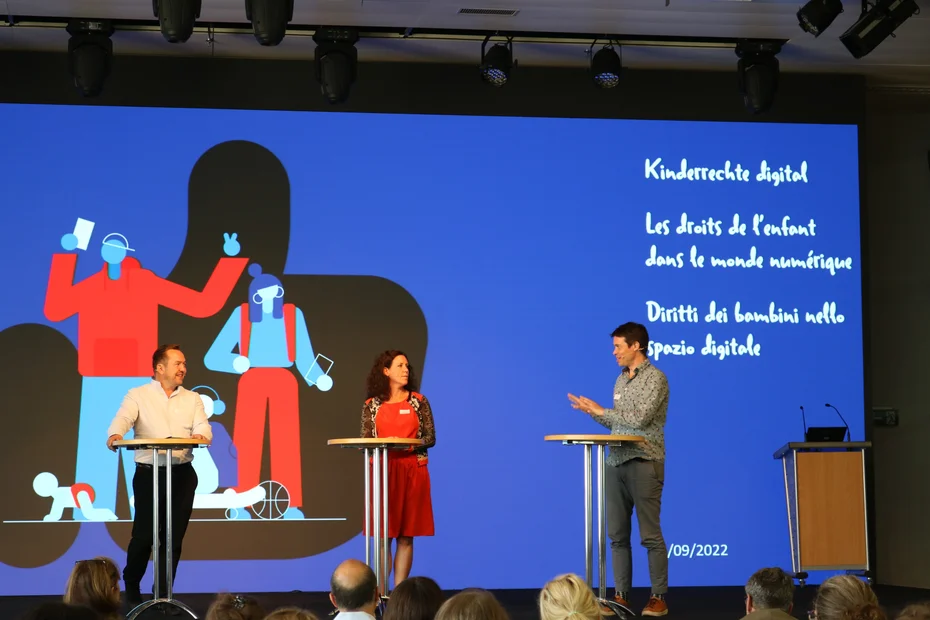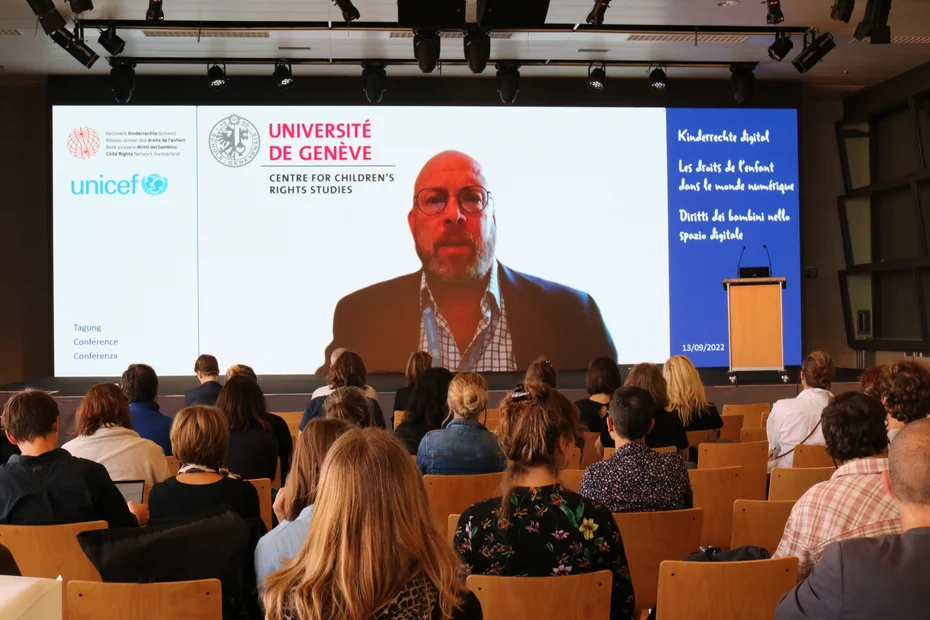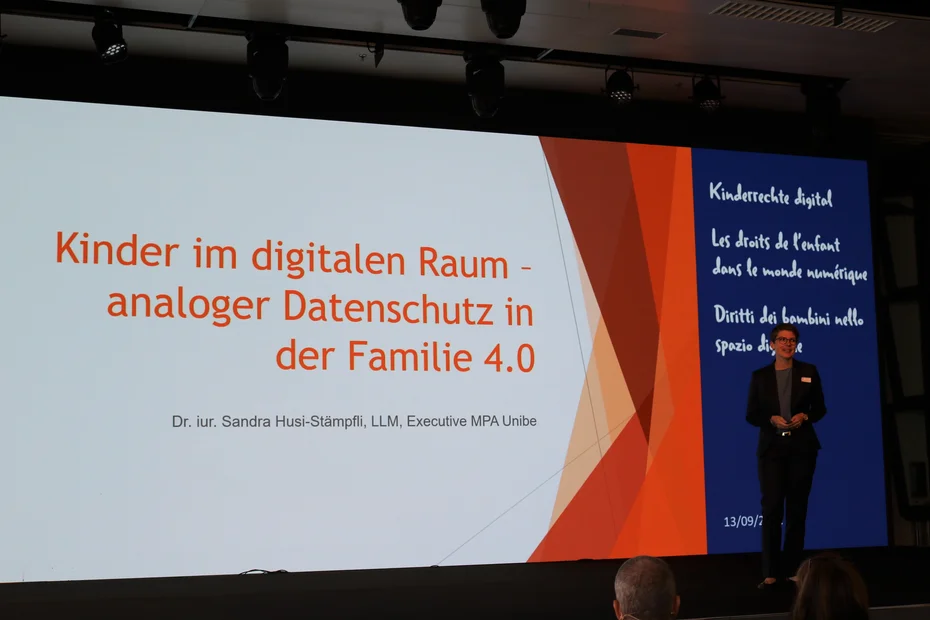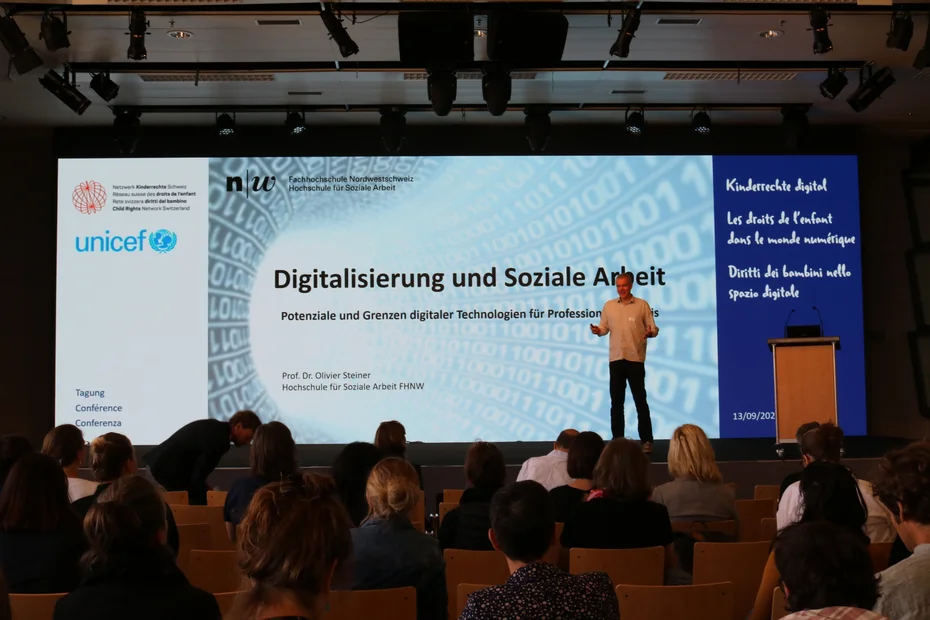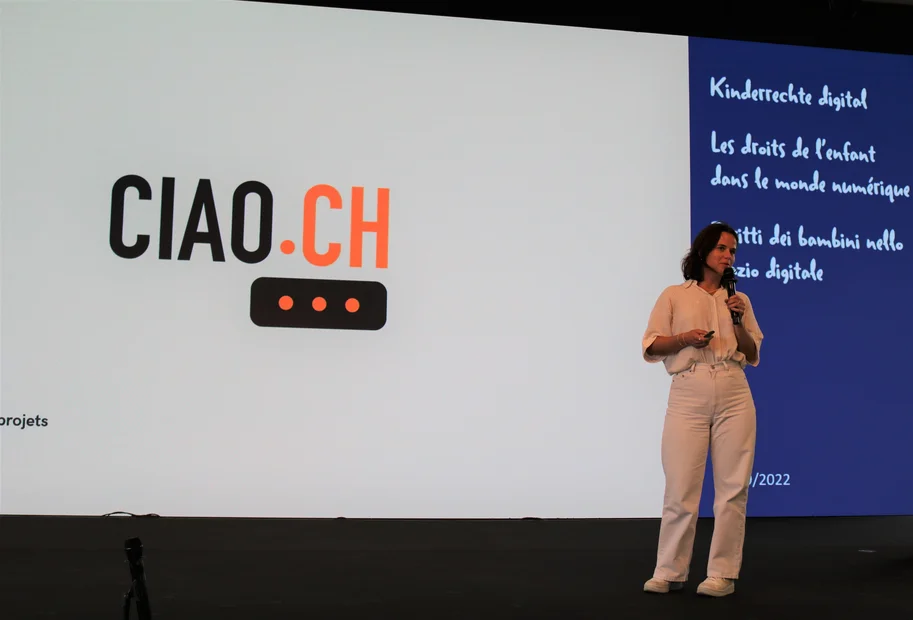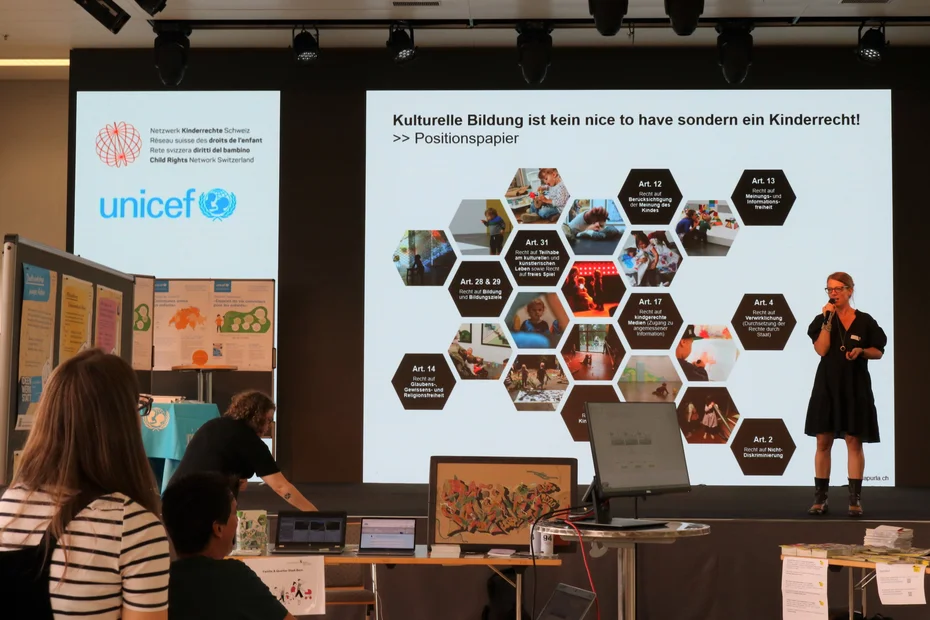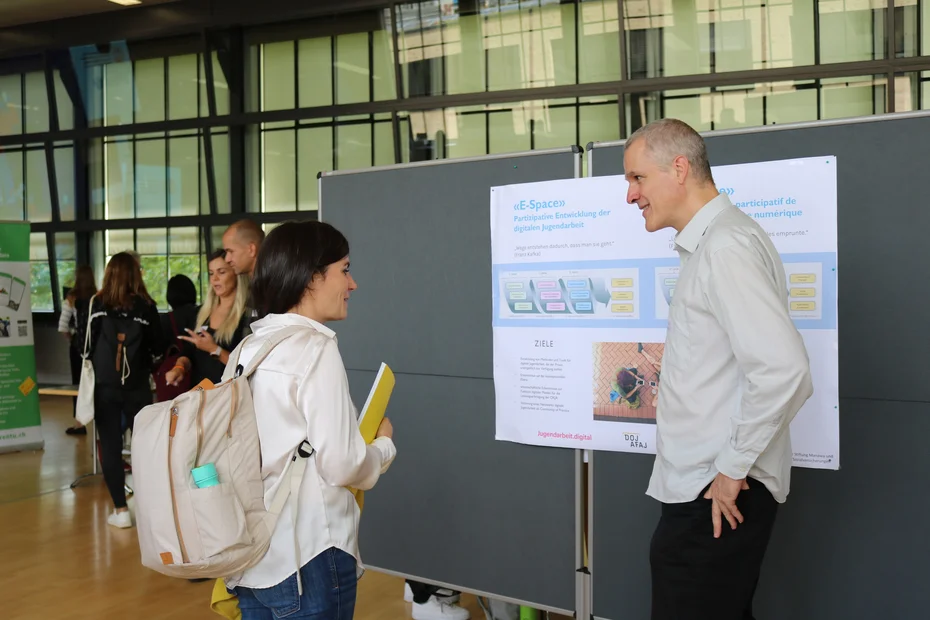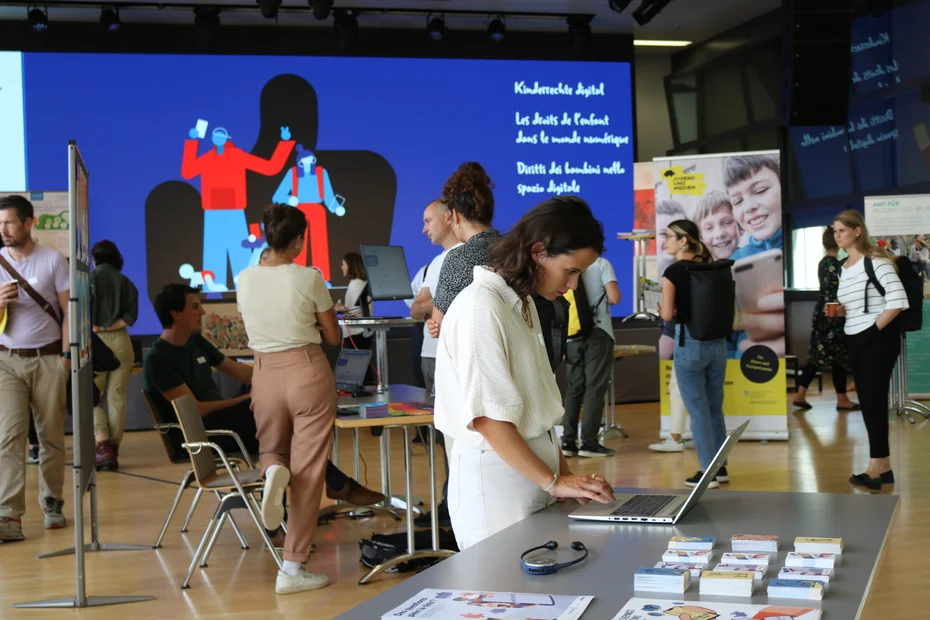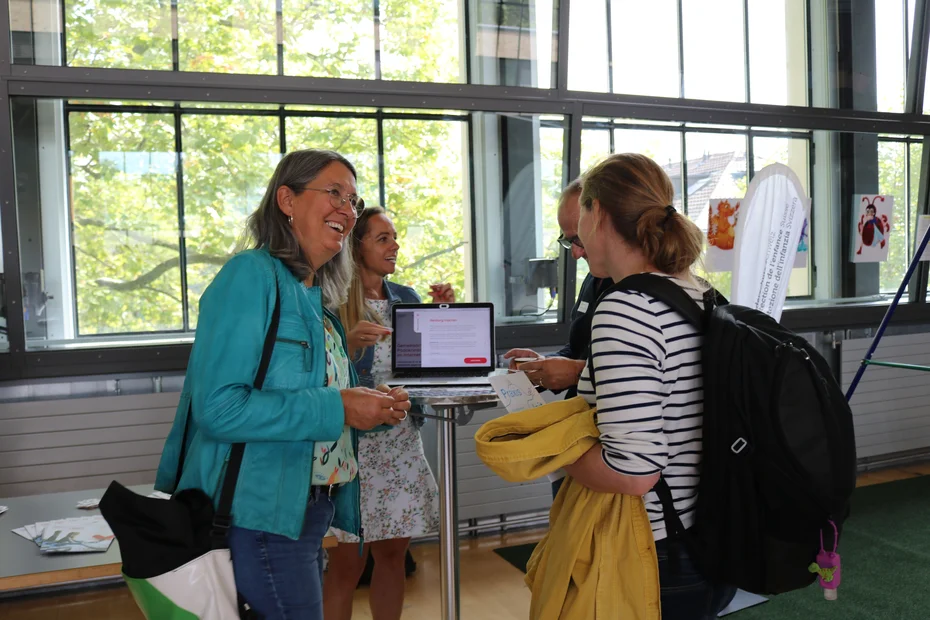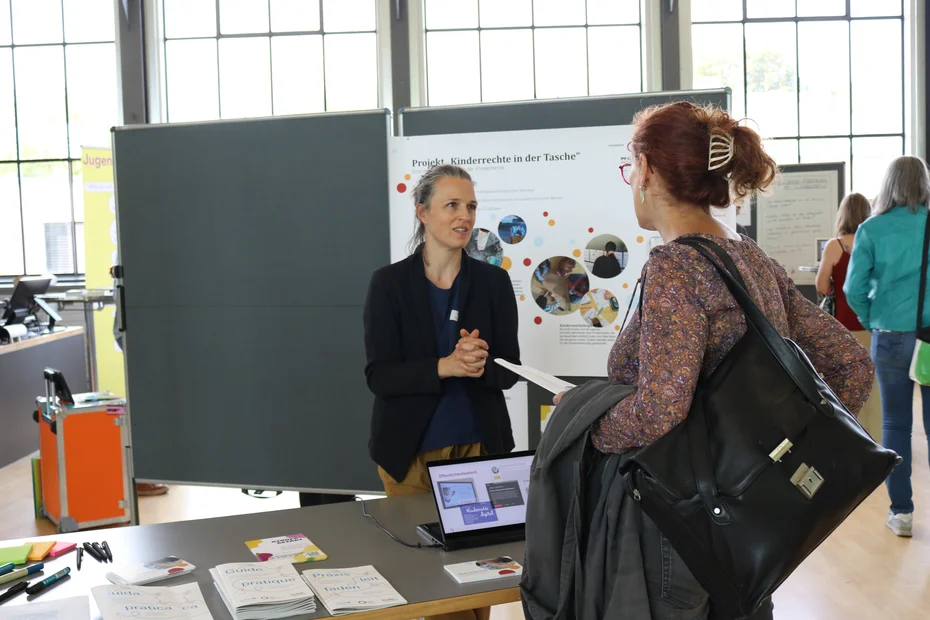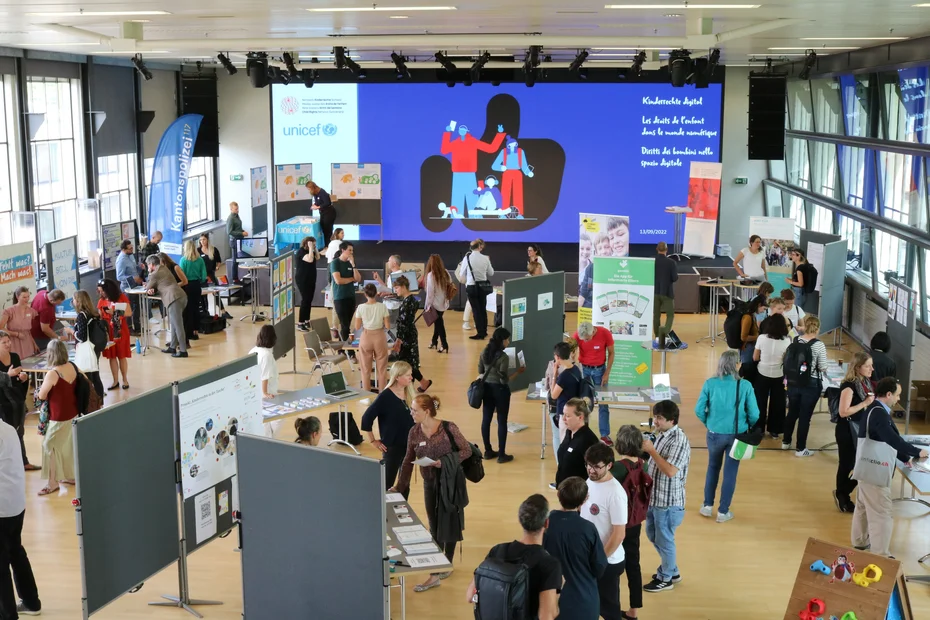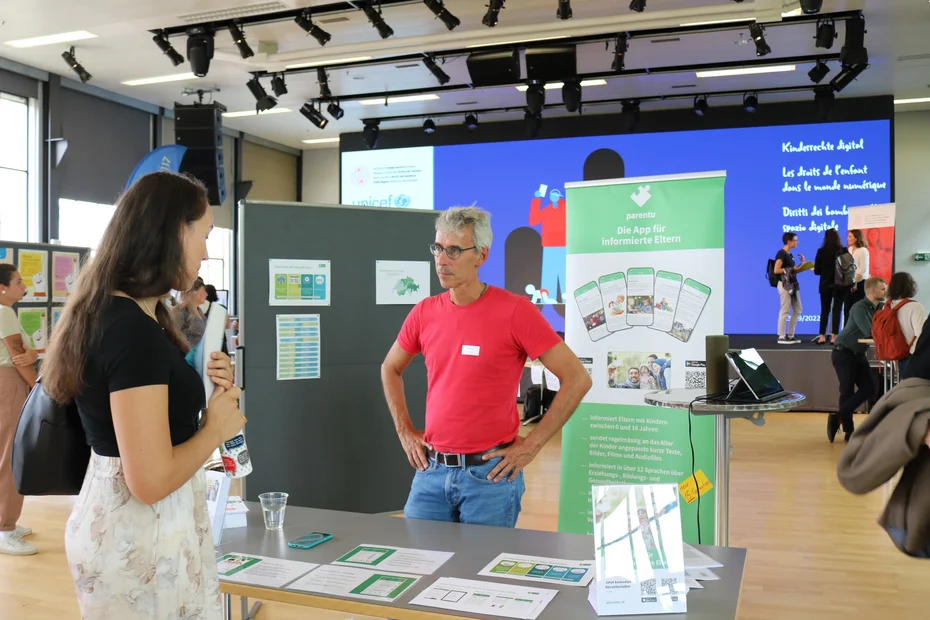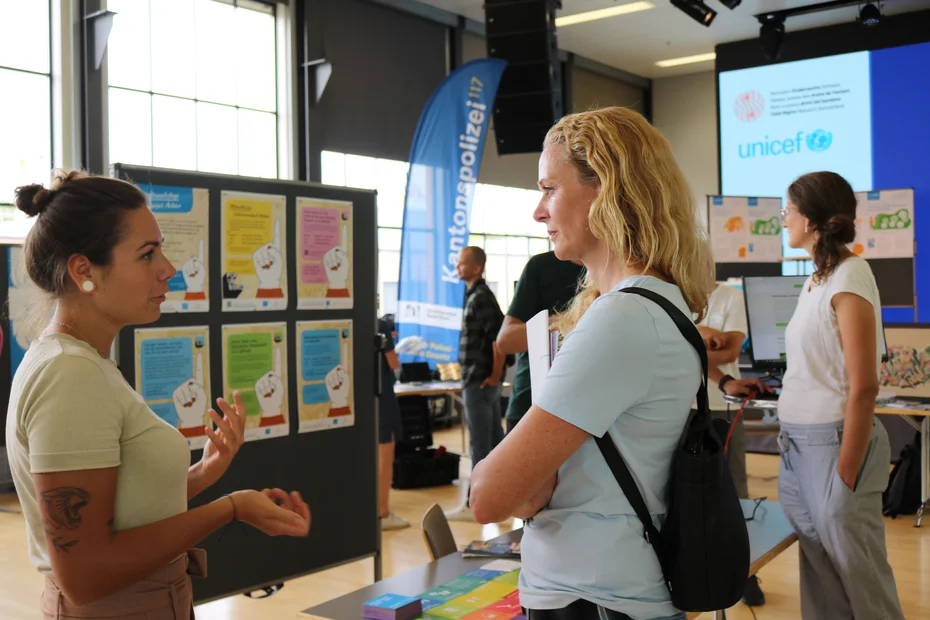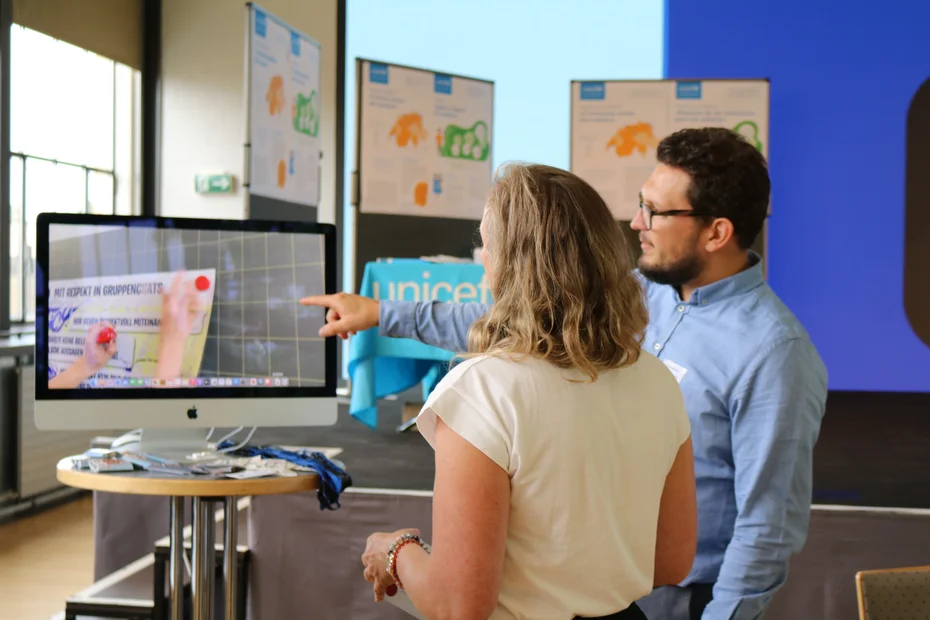The symposium “Opportunities and Challenges of the Digital World for the Development of Children and Young People” took place on September 13, 2022. A look back at the networking event, which was organized jointly by UNICEF Switzerland and Liechtenstein and the Child Rights Network Switzerland.
Around 150 people attended the event on September 13, 2022 and took advantage of the networking opportunities. Specialist academics and expert practitioners discussed the implementation of children’s rights in the digital world. In a “marketplace”, municipalities, towns, cities and civil society organizations presented a range of initiatives and offers for children and young people designed to help realize children’s rights in the digital sphere.
Morning program: Specialist presentations and panel discussion
Digital technologies are a constant presence in the day-to-day lives of children and young people: Education, health, economic life and leisure activities are increasingly based on digital technologies. The digital world is developing at lightning speed. This creates new opportunities for realizing children’s rights, but also poses the risk of violations of these rights. Children and young people must be considered in the digital transformation, and their needs and concerns must be taken into account.
Children and young people must be considered in the digital transformation, and their needs and concerns must be taken into account.
Philip D. Jaffé stressed that the right to access the digital world, the flow of information, and educational and communication opportunities is a fundamental children’s right. However, digitalization also entails risks in terms of both protecting children from online violence and protecting their privacy. Action is required, particularly with regard to the private sector’s role in protecting children’s rights. Private companies must be held accountable. They are required to respect children’s integrity and privacy in relation to children as consumers, the collection of data without children’s consent, and the use of algorithms for neuromarketing.
Sandra Husi-Stämpfli underlined the fact that today’s children often have a digital footprint even before they are born. For example, she herself has documented the lives of her little ones through numerous photos on social media, starting with their ultrasound scans, and given her children “smart” toys to play with. These all leave traces online. This posed numerous challenges with regard to data privacy and the protection of the children’s personal rights. Data privacy protects fundamental rights, and children are also entitled to it. Children could claim the protection of their fundamental rights not only against the state, but also against private individuals such as their parents. Parents are therefore obliged to handle their children’s data with care. The cornerstone of the protection of privacy in the family context is child consent. Data, including photos, may generally only be processed with a child’s consent. Greater awareness and training on legal ethics issues is urgently required, both within families and for professionals who may work with children.
In her presentation, Yara Barrense-Dias highlighted the link between young people’s screen use and health. Studies show how excessive screen time has a negative impact on health, for example by promoting obesity or affecting mental health. At the same time, measuring young people’s screen time is itself a challenging task, as for many young people the distinction between online and offline is not always clear. Involving young people themselves is crucial, particularly in studies relating to screen time. For example, a study in the canton of Vaud showed that almost 34 percent of young people believe their own internet use is problematic. However, validated measurements assume a smaller number. Young people are in a phase of emotional, physical and sexual transformation. It therefore comes as no surprise that digitalization is also playing an increasingly important role in sexuality. Sexting, the sending of intimate images or images with sexual content online, is a growing phenomenon among young people, with corresponding risks for the protection of their privacy. We need to raise awareness of safer sexting practices among young people, and give them access to high-quality information about online sexuality.
In his presentation, Olivier Steiner addressed the extent to which the digital transformation is increasingly shaping social work, and the potential and limitations arising from this. A stronger ethical foundation is needed for digital social work, based on the UN Convention on the Rights of the Child and the UN Convention on the Rights of Persons with Disabilities. This should be based on the principles of inclusion, the promotion of media literacy among children and professionals, the participation and involvement of children in data collection, and protection through guidance, advice and the right to privacy.
The subsequent panel discussion focused on the implementation of the UN Committee on the Rights of the Child’s recommendations for Switzerland in relation to the digital environment, in the areas of protection, promotion and participation.
Enhanced coordination and a national strategy for combating violence against children are needed to tackle online violence against children. This should also take the digital environment into account. The quality of data collection, for example on problematic internet use and its impact on children and young people, or on participation via digital tools, also needs to be urgently improved. Although there is a lot of data on media usage, most collection activities are privately funded. However, strategies regarding the scope of digitalization are required at both the national and cantonal level. Cantons are required to develop strategies for schools on dealing with digitalization, for example with regard to the prevention of violence.
But the digital transformation also requires that children and young people be encouraged to use digital media and embrace digitalization, both at school and in extracurricular settings such as youth work. Digitalization is also an opportunity to reach young people. Digital youth work could create formats that would give young people access to culture, enable them to form peer groups, and encourage their participation. Finally, parents also require an increasing amount of support and education. Digitalization must be embedded in counseling and education services right from early childhood. Parents should be given greater encouragement to take responsibility for helping their children use digital media.
Afternoon program: Marketplace for inspiration and networking
The afternoon session revolved around digitalization within child-friendly cities and urban development. Various municipalities and organizations presented their digital initiatives and services for children and young people within the framework of a practice-oriented marketplace. The focus was on sharing knowledge and networking.
During the market, there were exciting lightning talks by Peter Hruza (Parentu), Laura Krenzi (ciao.ch) and Karin Kraus (Lapurla) on the stage.
Through the websites ciao.ch and ontécoute.ch, the CIAO association provides information about adolescence, sharing ideas and helping people. The information is aimed at young Swiss people from French-speaking Switzerland. There is also a forum in which young people can discuss various topics with their peers. In addition, they are able to submit anonymous questions to experts on a range of topics such as sexuality, health or social media, and read past answers from specialists. CIAO therefore encourages young people to mobilize their own resources and take advantage of their peer network.
DOJ: umbrella organization for open child and youth work; Fachstelle SpielRaum: designer of play spaces
DOJ and Fachstelle SpielRaum jointly implement various projects relating to child-friendly cities and urban development. “Participlace” uses pilot communities to test the participation of children and young people in spatial development projects. Another initiative aims to level up residential environments that are home to socio-economically disadvantaged groups by encouraging small children to become more active. Digitalization is playing an increasingly important role in project implementation.
DSJ: umbrella association of Swiss youth parliaments
The easyvote.ch website enables and motivates young people to vote in referendums and elections. easyvote strengthens political interest and commitment by providing information on referendums, elections and current political issues in a neutral, easily understandable format.
engage.ch promotes political participation and political education among young people in Switzerland, using simple communication platforms that young people are familiar with in their day-to-day lives. Alongside social media, the key tool is the online platform engage.ch, which gives young people an easy way to share their concerns and ideas.
Education Department of the Canton of Basel-Stadt; GGG Basel: society for the good and the common benefit
We presented the digital Basel platform for young artists kulturkick.ch, in particular the new addition (since 2021) of a youth-friendly digital point of contact for licensing, legal and copyright issues. The direction and additional content were developed in a participatory process with young people and young adults. The platform contains specially produced video and audio files in which experts provide information and young artists provide feedback.
University of Applied Sciences and Arts Northwestern Switzerland
The Institute for Studies in Children and Youth Services, the FHNW university, the jugendarbeit.digital youth empowerment association and the umbrella organization for open child and youth work (DOJ) are conducting the E-Space project, an action research project on the socio-spatial development of digital youth work.
Various jugendarbeit.digital services and projects were presented, including Jugendapp, Smalljobs and Kryptokids.
We run the Internet, Mobile & Co module throughout the canton of Basel-Stadt. The module comprises three lessons and is taught digitally on iPads. The aim is for students to learn from role models by solving tasks independently on the digital device. The content covers the topics of personal data, photos, dealing with strangers, and how to behave in chatrooms.
Kinderschutz Schweiz: child protection foundation
Kinderschutz Schweiz presented its services in the digital sphere, such as Privacy Playgrounds.
National Platform for Youth and Media
Various services and publications from young people and the media were presented.
OST: Eastern Switzerland University of Applied Sciences; University of Teacher Education Lucerne
“Children’s rights in your pocket”: A participatory web app for communicating and exercising children’s rights. A project of the Eastern Switzerland University of Applied Sciences, the University of Teacher Education Lucerne and UNICEF Switzerland and Liechtenstein, with the Ombuds Office Children’s Rights Switzerland, the PACH foster child and adoption association, Pro Juventute, Terre des Hommes Suisse, Integras, éducation21, procap and Pro Infirmis.
Parentu provides information for parents in 13 languages, ensuring that all children can grow up in a supportive and healthy environment. The app sends all the key information about child development straight to parents’ smartphones via push notifications.
The staatslabor helps the public sector become more collaborative, courageous and open, so that it can better serve society in the digital age. Various staatslabor services and projects were presented, such as ThunTok and Innovation Champions.
City of Arbon, Society Department
The city of Arbon has developed an eParticipation Platform on the meinThurgau platform that it uses for a wide range of participation processes. The Society team provided an insight into current projects and shared its initial experiences.
City of Bern, Socio-Cultural Department
Startstutz is the city of Bern’s funding scheme for youth cultural activities. Young people and young adults up to the age of 25 are supported in their efforts to develop and implement an independent and self-organized youth culture. The contact point for youth culture helps young people and young adults submit projects and obtain additional funding, and can also arrange in-depth assistance from experts.
All year round, FÄGER offers a diverse program of holidays and leisure activities, irrespective of socio-economic background. The program is open to children and young people aged 5 and over from the city of Bern and 27 partner municipalities.
In collaboration with the staatslabor, the city of Thun has developed the “ThunTok” initiative as a prototype for a digital service public contact point for children. The result was a social media-like platform where children can post their demands and visions and submit them directly to the relevant administrative bodies.
clickandstop.ch
. clickandstop.ch is Switzerland’s first online platform for reporting crimes against children. The platform can be used to report pedocriminal content circulating on the internet easily and anonymously. It also provides information on the associated risks that children and young people may encounter, how to protect them against such risks, and who people can turn to for help or advice.
The national Lapurla initiative creates creative freedom for the very young. Together with their caregivers, children aged 0–4 discover cultural institutions as diverse sensory worlds. Inspired by artists and cultural mediators, they explore their surroundings. Because culture strengthens your personality right from the outset. An initiative of the Migros Culture Percentage and the Bern University of the Arts (HKB).
The detailed symposium program can be found in the program brochure.
The symposium was organized jointly by the Child Rights Network Switzerland and UNICEF Switzerland and Liechtenstein.
Florian Hadatsch, UNICEF Switzerland and Liechtenstein: [email protected]
